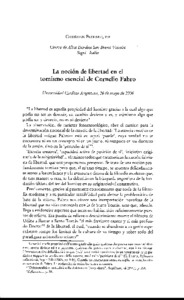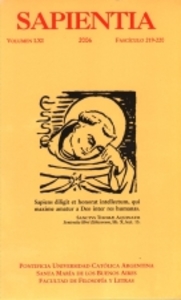Por favor, use este identificador para citar o enlazar este ítem:
https://repositorio.uca.edu.ar/handle/123456789/12158| Campo DC | Valor | Lengua/Idioma |
|---|---|---|
| dc.contributor.author | Ferraro, Christian | es |
| dc.date.accessioned | 2021-08-26T09:45:05Z | - |
| dc.date.available | 2021-08-26T09:45:05Z | - |
| dc.date.issued | 2006 | - |
| dc.identifier.citation | Ferraro, C. La noción de libertad en el tomismo esencial de Cornelio Fabro [en línea]. Sapientia. 2006, 61 (219/220). Disponible en: https://repositorio.uca.edu.ar/handle/123456789/12158 | es |
| dc.identifier.issn | 0036-4703 (impreso) | - |
| dc.identifier.uri | https://repositorio.uca.edu.ar/handle/123456789/12158 | - |
| dc.description.abstract | Abstract: The study intends to present a panoramic and articulated view of Fabro's doctrine on freedom. This doctrine is the result from a reading of the Thomistic interpretation that at the same time is attentive to the exigency of the foundation of freedom that characterizes the modern thought. The new conception has as its basis three theses: 1) The choice of the last end in concrete; 2) The qualitative emergence of the will; 3) The principality of the "I" as "operating totality". The last end is the same for all people and all the people desire happiness, but not al! people search for it where it really is. This is the moment of the passage from the abstract-formal sphere to the real-existential one. The determination of the last end in concrete depends on the will, and announces its domination over the entice subjective sphere. In fact, there are three realms of domination of the will: it dominates its own act and so the freedom of exercise emerges aboye the freedom of specification; the will dominates the faculties of the soul, firstly, the intellect; the will dominates its own object. Ever though the will is only a faculty, it is the faculty of the person as such and reveals the subject as an "operating totality". The conclusion is that freedom must be interpreted as "participated creativity", a formula in which "creativity" means the radical originality and control of the act and "participated" means the metaphysical root of this perfection in the spiritual nature. | es |
| dc.format | application/pdf | es |
| dc.language.iso | spa | es |
| dc.publisher | Pontificia Universidad Católica Argentina. Facultad de Filosofía y Letras | es |
| dc.rights | Acceso abierto | * |
| dc.rights.uri | http://creativecommons.org/licenses/by-nc-sa/4.0/ | * |
| dc.source | Sapientia. 2006, 61 (219/220) | es |
| dc.subject | Fabro, Cornelio, C.S., 1911-1995 | es |
| dc.subject | TOMISMO | es |
| dc.subject | LIBERTAD | es |
| dc.subject | VOLUNTAD | es |
| dc.title | La noción de libertad en el tomismo esencial de Cornelio Fabro | es |
| dc.type | Artículo | es |
| uca.disciplina | FILOSOFIA | es |
| uca.issnrd | 1 | es |
| uca.affiliation | Fil: Ferraro, Christian. Centro de Altos Estudios San Bruno Vescobo; Italia | es |
| uca.version | publishedVersion | es |
| item.grantfulltext | open | - |
| item.languageiso639-1 | es | - |
| item.fulltext | With Fulltext | - |
| Aparece en las colecciones: | SAP - 2006 Vol LXI nro. 219-220 | |
Ficheros en este ítem:
| Fichero | Descripción | Tamaño | Formato | |
|---|---|---|---|---|
| nocion-libertad-tomismo-fabro.pdf | 446,62 kB | Adobe PDF |  Visualizar/Abrir | |
| sapientia219-220.pdf.jpg | 25,57 kB | JPEG |  Visualizar/Abrir |
Visualizaciones de página(s)
167
comprobado en 30-abr-2024
Descarga(s)
301
comprobado en 30-abr-2024
Google ScholarTM
Ver en Google Scholar
Este ítem está sujeto a una Licencia Creative Commons

